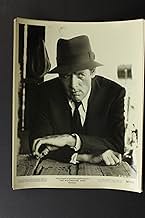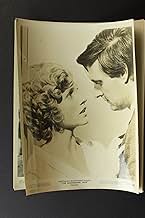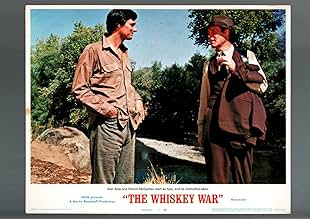Ajouter une intrigue dans votre langueA federal agent attempts to make some real money before the alcohol ban is lifted so he sets his sights on the whiskey cache of an old army buddy.A federal agent attempts to make some real money before the alcohol ban is lifted so he sets his sights on the whiskey cache of an old army buddy.A federal agent attempts to make some real money before the alcohol ban is lifted so he sets his sights on the whiskey cache of an old army buddy.
- Réalisation
- Scénario
- Casting principal
- Boyd Caswell
- (as Richard Peabody)
- Young Wife
- (as Terry Garr)
Avis à la une
The movie is based in the last days before the repeal of the 18th Amendment of the U.S. Constitituion which made it a crime to import, buy or drink alcohol. A complete failure in regard to legislation. The principle of the movie revolved around a LARGE stash of 8 year old whiskey owned by Alan Alda's char acer that distributors would of paid twice their weight in gold for. What Mr. MacIntyre's missed was that the time and place were during the Great Depression in the Kentucky, the American South, which was triple-poor compared to the rest of the world. Alan Alda's character was not part of a family, but a member of a community who made whiskey to sell to the rest of the country because the soil of their farms could produce little else to keep them from going hungry. It was choice many people made during those times. The whiskey for Alda's character was a legacy from his father and his ticket out of the poor house along with his lady friend. Part of the dialog was leaving to go live in California, the eternal promise land even by today's standards.
Patrick McGooan's character was CROOKED, as in criminal, Federal officer looking to make himself rich from his old Army buddy "Son Martin's" whiskey. He was anything, but hard working and when confronted by the black man with the shotgun, even less so. Thus, his contact with Richard Widmark and his gang. When the gang found they no longer needed McGooan's character they turned on him. In turn Alda's neighbors turned on him, when the gang, posing as MORE Federal officers started raiding his neighbors stills and homes. They refused him service and credit at the local store among other things. I saw this flick as teenager and the storyline has remained with me for decades. It seemed that much of the story revolved around the old nursery rhyme about Chicky Licky who no one wanted to help make the bread, but they sure wanted to help eat it. The same thing is definitive in this movie, but the ending was beautiful in the destruction of the bad guys and the reconciliation of the neighbors. I'm surprised this movie isn't out on DVD or VHS.
It's filled with thoroughly unlikable characters, with Widmark returning to his early, sociopathic roles, McGoohan utterly corrupt, and Alda very convincing as an unlikable moonshiner. Quine, who had been riding high in the 1950s, was near the end of his string, and was clearly trying to get some of that Bonnie-and-Clyde vibe, but everything is too clean for the back-end setting of hillbilly country just before the 1932 election. Still, it's a fine opportunity to see some classic supporting actors in brief bits, including Will Geer, Harry Carey Jr., and Max Showalter, and some players becoming well known inbits, including Teri Garr, John Schuck, and Tom Skerritt. Despite these small pleasures, it's a thoroughly and probably deliberately nasty movie. Elmore Leonard scripted from his own novel.
Le saviez-vous
- AnecdotesThe federal Volstead Act did not prohibit drinking alcohol. It prohibited manufacture, sale, transport, distribution and import/export. It was left to the states to make laws to prohibit possession and consumption. All the states did, but Nevada's was repealed on state constitutional grounds.
- Gaffes(at around 1h 20 mins) Frank Long leaves payment for his room on the hotel registry. The top $1 bill is a modern "small size" Federal Reserve Note with a green seal. The first of such notes went into circulation in 1963, some 30 years after the movie's prohibition era, which ended in 1933. When small size US currency replaced "large size" currency in 1928, all $1 bills were silver certificates displaying dark blue seals and serial numbers.
- Citations
Mr. Baylor: If'n the law needs upholdin' in these parts, Mr. Frank Long, I uphold it, *I* take care of it.
Frank Long: You all confiscatin' whisky, Mr. Baylor?
Mr. Baylor: Well, I reckon you might say so - a swig at a time. Royce, give this ol' Long boy a sample of our white lightenin', will ya?
[Frank takes a swig]
Mr. Baylor: Right good stuff, huh, Mr. Long? Ah, it'd be a cryin' shame to throw that out in the ground just because some titless old women figure a feller oughtin' to drink that, wouldn't it? I'm askin' you now, wouldn't it?
- ConnexionsFeatured in Shooting the Moonshine War (1970)
Meilleurs choix
- How long is The Moonshine War?Alimenté par Alexa
Détails
- Date de sortie
- Pays d’origine
- Langue
- Aussi connu sous le nom de
- The Moonshine War
- Lieux de tournage
- Stockton, Californie, États-Unis(location shooting)
- Société de production
- Voir plus de crédits d'entreprise sur IMDbPro
- Durée
- 1h 40min(100 min)
- Mixage
- Rapport de forme
- 2.35 : 1





































